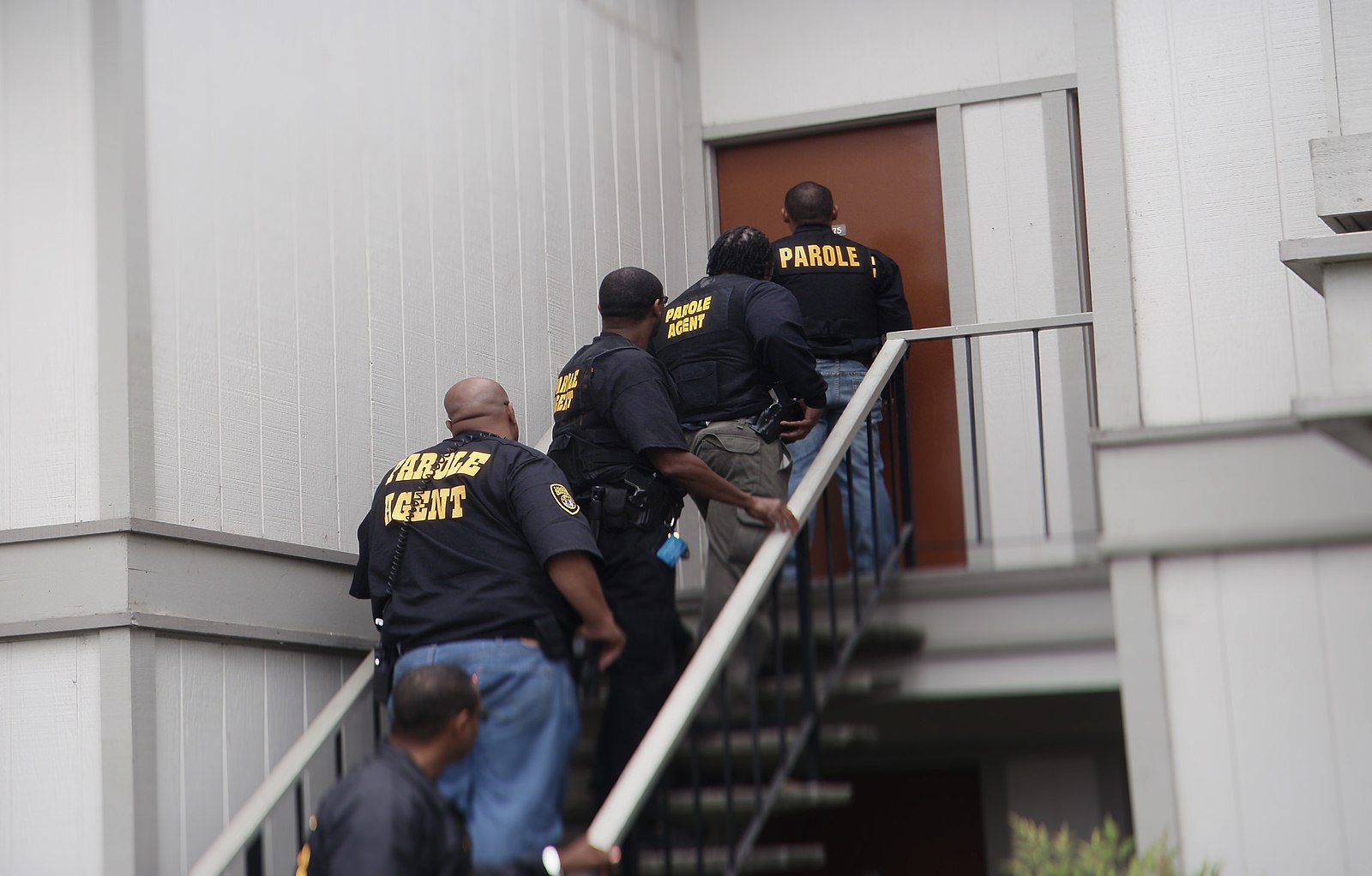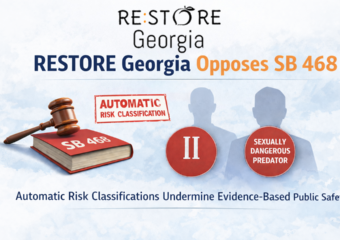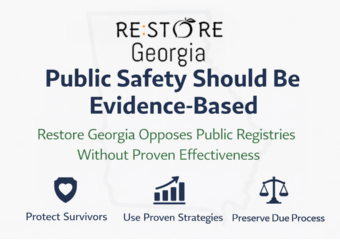FILTER MAG: Enough With the Sex Offender Registry
By Christy Perez & Kastalia Medrano
Originally Published October 23, 2024 at FilterMag.com
Law enforcement has done a good job of portraying recidivism as a kind of unfortunate tendency some people just can’t help. Rarely do media and pop culture indicate that a parole violation can mean the state equivalent of the FBI taking you into custody without warning because you were using an adult webcam site while inside your own home.
Christy paroled out of Georgia Department of Corrections custody in September 2023, after about 13 years of incarceration stemming from survival sex work. Being forced to register as a sex offender comes with an onslaught of fees—often hundreds of dollars per month—that are mandatory to pay as a condition of parole. At the same time, the registry disqualifies people from almost every job that isn’t remote or very rural, which makes livestreaming on an adult webcam site a logical option.
Sex work is often one of the few sources of income, if not the only one, that people on a sex offender registry are able to access. Anything prohibited by law, such as prostitution, is an automatic parole violation for anyone—on or off the registry—but there’s nothing illegal about livestreaming by consenting adults. However, parole, probation and sex offender registries go past the law to criminalize people for activity that is legal.
With less than five months left on parole, Christy is now in county jail—ostensibly because she’s not allowed to look at porn.
The “special conditions” Georgia imposes on registrants who are also on parole are notorious for ambiguity. For example, could a condition that supervisees “shall not use or consume any controlled substance or mind altering drug including alcohol, except pursuant to a legal doctor’s prescription” be interpreted to allow low-THC oil, but prohibit nicotine? No parole officer is likely to apply this to cigarettes, but it’s not out of the question it could be applied to vapes.
In Christy’s case, consider the following examples from that list of special conditions:
—The individual under supervision shall not purchase or possess any pornographic or sexually explicit materials.
—The individual under supervision shall not frequent or be employed by any business exhibiting pornographic materials or activities.
—[The individual] will not visit/access pornography sites or chat rooms on the Internet.
—The individual under supervision shall remain fully and appropriately clothed and will not engage in lewd behavior when in public or when potential for public view exists.
—The individual under supervision shall not associate with prostitutes and will avoid areas known to have prostitution activity.
—The individual under supervision shall work only at places pre-approved by his/her community supervision officer.
Is livestreaming from inside your home “public view”? Is a third-party platform a business, and is using one to livestream a job? Are you allowed to have nudes of your own body on your own phone? What prevents any area from being “known to have prostitution activity” if a parole officer decides it is? And, ultimately, is legal sex work clearly prohibited?
The condition directly applicable to this situation is the ban on “accessing pornography sites or chat rooms on the Internet,” but here there’s an argument to be made about intent—which the Georgia State Board of Pardons and Paroles has indicated does matter. Per one of the other conditions, supervisees may not “attend any place, business, amusement, social event or gathering of any type for the purpose of coming into contact with minors.” In other words, the Board acknowledges that it’s possible that someone on the registry might go somewhere in public for some reason other than preying on children, and doesn’t seek to restrict that. If someone visits an online version of these places (like a chat room) for a purpose that is clearly not coming into contact with minors (like visiting a chat room for people 18 and up), wouldn’t the approach to those situations be consistent?
Livestreaming adult content potentially allows someone to keep up with their registry fees without going into any public places, through legal work, in a space that does not allow minors and does not serve alcohol. Few options seem better suited to the Board’s conditions, and as the registry continues to grow, it’s reasonable to assume that more people will access adult websites with the specific intent of remaining in compliance with conditions that the Board imposes and simultaneously takes away the means to fulfill. It’s unclear what the public-safety benefit of revoking parole would be in these cases. The Board did not respond to Filter‘s request for comment.
In our judicial system we don’t apply blanket restrictions to particular groups, but almost nothing about sex offender registries is individualized.
The federal Sex Offender Registration and Notification Act (SORNA) uses a tier system for classifying registrants based on their conviction. States are incentivized to model their own systems after SORNA, but most, including Georgia, do not. While Christy’s conviction would let her off the registry after 15 years under SORNA, in Georgia it’s a lifelong requirement for everyone. In July, the state enacted legislation allowing people to petition for removal at age 80. As of August, there were 38,339 people registered as sex offenders in Georgia—a more than 50-percent increase over the past decade.
Though the state refers to registry classification in a way that invites the public to believe everyone gets evaluated and classified as Level I, Level II or “Sexually Dangerous Predator,” about two-thirds of registrants, including Christy, are never assigned a level. This indicates that they aren’t considered a risk by the volunteer members of the Sex Offender Registration Review Board, but also that they just aren’t considered. Everyone, regardless of conviction or mitigating circumstances, is painted with the same broad brush, which is how the state justifies monitoring everyone’s internet access as if they’re equally motivated to distribute child pornography.
In our judicial system we don’t apply blanket restrictions to particular groups, but almost nothing about sex offender registries is individualized. This is particularly egregious considering that these registries are drag nets for a variety of groups already targeted for state violence, including transgender women, people who engage in sex work, people who use drugs and people living with HIV.
“The appropriate recommendations and enforcement of intermediate sanctions, such as treatment referral, administrative hearings, electronic monitoring, GPS monitoring, day reporting centers and parole detention centers result in the low percentage of technical parole violators being revoked and returned to prison,” the Board stated in its most recent annual report. “The purpose of intermediate sanctions is to bring the offenders who are not a threat to public safety back into compliance with their parole conditions.”
Technical violations exist to keep people in poverty. They serve no other function.
Each year since 2017, technical violations have represented less than 1 percent of cases where the Board sent someone back to prison. That would mean that of the 1,552 parole revocations in 2023, for instance, only a handful could have been prompted by missing curfew or falling behind on fines and fees. But these numbers do not include people who were arrested for technical violations and spent days or weeks or months in county jail before they were ultimately allowed to continue serving their parole in the community.
Community supervision, especially for anyone on a registry, is not designed to be a second chance. It is designed to be an obstacle course that can’t necessarily be completed through hard work alone. Without generational wealth or luck all roads ultimately lead back to prison or jail.
Technical violations exist to keep people in poverty. They serve no other function. No evidence supports the premise that extra-judicial registry conditions make children safer; child sexual abuse is overwhelmingly perpetrated by relatives and acquaintances. Children are more likely to be harmed by registries themselves than by people on them; 25 percent of people placed on sex offender registries are juveniles.
After a year of scrambling for any work she was allowed to accept, Christy had just gotten a promising job interview with a nonprofit, and missed it because she was in county jail. She was recently appointed to the advisory board of a university pilot program exploring health care during re-entry, and will miss the inaugural meeting if she’s still in county jail, or in prison. Next she’ll miss a panel where she’s due to speak on incarceration and the clergy. Then her keynote speech at a trans health care symposium. Then her first Christmas with her husband.
Even a couple of days in jail is enough for someone to lose their job. To fall behind on rent; lose their car; lose their pets; ruin their credit score. Enough for someone to get evicted and have nothing to come back to except debt by the time a supervision officer tells them, Never mind; you’re free to go.





